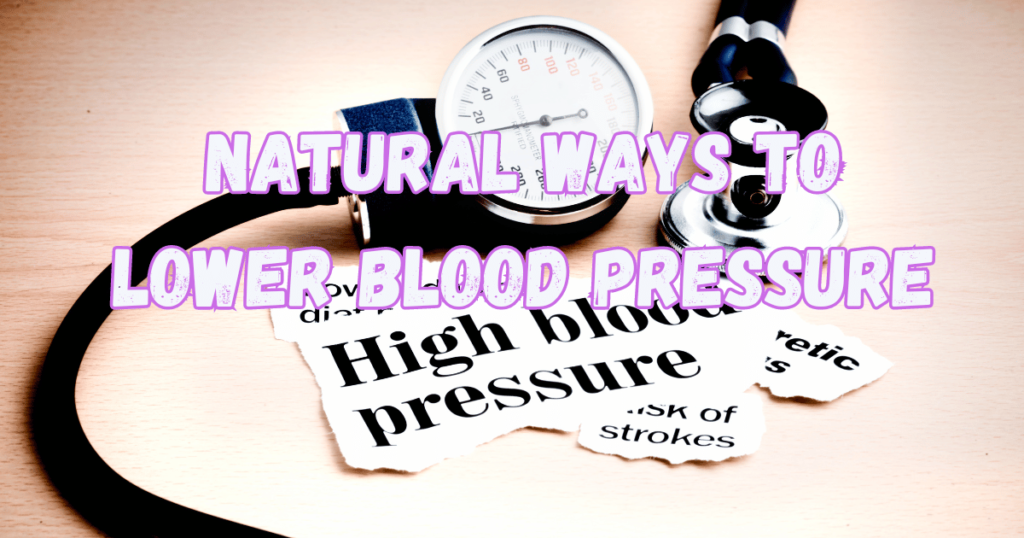Natural Ways To Lower Blood Pressure, High blood pressure, also known as hypertension, is a common health concern, especially in the United States. It can lead to serious health problems like heart disease and stroke if not managed properly. While medication is often prescribed to control blood pressure, many people are interested in natural ways to lower it. In this article, we’ll explore simple, natural methods to manage blood pressure effectively.

Understanding Blood Pressure
Before diving into natural remedies, it’s essential to understand what blood pressure is. Blood pressure is the force exerted by the blood against the walls of the arteries. It’s measured in millimeters of mercury (mmHg) and recorded as two numbers – systolic (when the heart beats) over diastolic (when the heart rests between beats).
Natural Ways to Lower Blood Pressure
1. Diet and Nutrition
1. Diet and Nutrition
A heart-healthy diet plays a pivotal role in controlling blood pressure. It’s not just about eating less but eating right. Here’s how you can optimize your diet:
- Fruits and Vegetables: These are rich in potassium, which helps balance the amount of sodium in your cells and is crucial for keeping blood pressure in check. Bananas, oranges, and avocados are excellent potassium sources. Leafy greens like spinach and kale are not only high in potassium but also magnesium, another mineral that aids blood pressure regulation.
- Whole Grains: Whole grains like oats, brown rice, and whole wheat are high in fiber. Fiber helps in maintaining a healthy weight and can have a beneficial effect on blood pressure. They also keep you full longer, preventing overeating.
- Lean Proteins: Incorporate lean protein sources like fish, which are high in omega-3 fatty acids, and known to reduce blood pressure. Poultry, when eaten without the skin, is another good source. Plant-based proteins like beans, lentils, and chickpeas are not only high in protein but also fiber and other heart-healthy nutrients.
2. Reduce Sodium Intake
Sodium is a major culprit in raising blood pressure. Most of the sodium in our diet comes from processed and canned foods. To reduce sodium intake:
- Prefer fresh foods over canned or processed ones.
- Use herbs and spices instead of salt for flavoring.
- Be mindful of ‘hidden’ sodium in foods like bread, pizza, and sandwiches.
3. Regular Physical Activity
Physical activity is crucial in maintaining a healthy blood pressure. It strengthens the heart, enabling it to pump more blood with less effort, thus reducing the pressure on the arteries. Aim for:
- At least 150 minutes of moderate aerobic activity or 75 minutes of vigorous activity a week.
- Activities like brisk walking, jogging, cycling, or swimming are excellent choices.
- Consistency is key. Try to incorporate some form of exercise into your daily routine.
4. Weight Management
Excess weight can increase the risk of hypertension. Even a small amount of weight loss can have a significant impact on your blood pressure. Strategies include:
- Combining a healthy diet with regular exercise.
- Eating smaller portions and avoiding high-calorie, low-nutrient foods.
- Keeping a food diary to track what you eat.
5. Stress Management
Chronic stress can lead to a temporary increase in blood pressure. Long-term stress can affect how you handle health-related behaviors. To manage stress:
- Practice relaxation techniques like deep breathing, meditation, yoga, or tai chi.
- Allocate time for hobbies and activities you enjoy.
- Seek professional help if you’re struggling to manage stress on your own.
6. Limit Alcohol and Quit Smoking
Alcohol can raise your blood pressure, even if you’re healthy. It’s important to drink in moderation. Smoking, on the other hand, damages your blood vessels and can raise your blood pressure. Quitting smoking can improve your overall heart health.
7. Get Enough Sleep
Lack of sleep can hurt your body’s ability to regulate stress hormones, leading to high blood pressure. Good sleep habits include:
- Sticking to a regular sleep schedule.
- Ensuring a comfortable sleep environment.
- Avoid caffeine and heavy meals before bedtime.
8. Monitor Your Blood Pressure at Home
Home monitoring can help you keep tabs on your blood pressure, make certain your lifestyle changes are working, and alert you and your doctor to potential health complications.
9. Natural Supplements
Some supplements may aid in lowering blood pressure. These include:
- Garlic extracts have been shown to have a beneficial impact on blood pressure and cholesterol levels.
- Omega-3 fatty acids, found in fish oil, which can help lower blood pressure.
- Coenzyme Q10 is an antioxidant that might help lower blood pressure.
Always consult with a healthcare provider before starting any supplements.
10. Stay Hydrated
Staying well-hydrated is essential for your kidneys to function properly, which helps regulate blood pressure and your overall health.
Conclusion
Lowering blood pressure naturally involves a combination of healthy lifestyle choices. While these methods can be effective, they should complement and not replace treatments prescribed by your healthcare provider. Remember, managing blood pressure is a lifelong commitment to your health.
FAQs
Q: How can you lower blood pressure naturally and quickly? A: Reducing sodium intake, engaging in regular physical activity, and managing stress can lead to noticeable improvements in a relatively short time.
Q: How do I lower blood pressure without medication? A: Focus on a healthy diet, regular exercise, weight management, and stress reduction. Also, monitor your blood pressure regularly.
Q: Are there natural ways to lower blood pressure during pregnancy? A: Pregnant women should consult their doctor for safe methods. Generally, mild exercise, reduced salt intake, and stress management are considered safe.
Q: Can drinking water lower blood pressure? A: Staying hydrated helps the heart pump blood more easily, which can help to lower blood pressure.
Remember, always consult with a healthcare professional before making significant changes to your lifestyle, especially if you have existing health conditions or are on medication.


